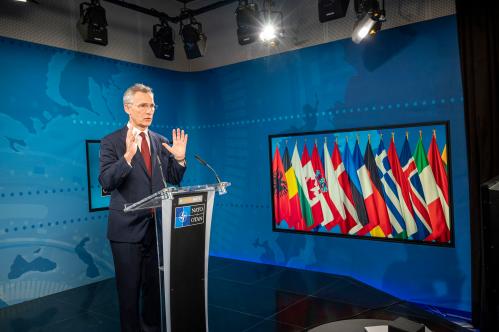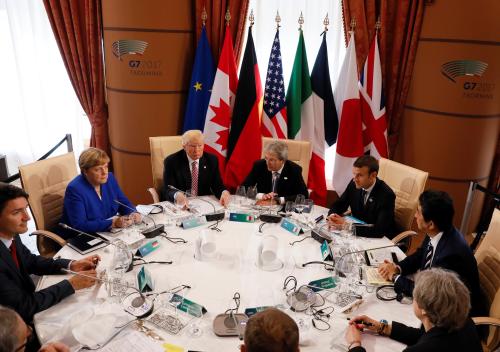The end of the Cold War scrambled U.S. foreign policy — and then 9/11 scrambled it again, writes James Goldgeier. Here’s what remains the same. This article originally appeared in The Washington Post.
 In the mid-2000s, Derek Chollet and I decided to write a book about the years between the end of the Cold War and the start of the war on terrorism. This was a period in which the United States stood atop the world, with overwhelming political, economic, military, diplomatic and ideological power. We wrote of 9/11 that in “an instant, it seemed the core question raised by the fall of the Berlin Wall on 11/9 [Nov. 9, 1989] — what to do with American power absent a global adversary — had been answered.”
In the mid-2000s, Derek Chollet and I decided to write a book about the years between the end of the Cold War and the start of the war on terrorism. This was a period in which the United States stood atop the world, with overwhelming political, economic, military, diplomatic and ideological power. We wrote of 9/11 that in “an instant, it seemed the core question raised by the fall of the Berlin Wall on 11/9 [Nov. 9, 1989] — what to do with American power absent a global adversary — had been answered.”
While it appeared that the attacks of Sept. 11, 2001, had changed everything, trends that emerged in the 1990s lived on, primarily in the ways that the Cold War’s end reshaped Democratic and Republican foreign policy priorities. Today, as U.S. military operations in Iraq and Afghanistan have wound down two decades after 9/11, it is not terrorism, but the strategic competition with China that dwarfs all other foreign policy issues in Washington.
Conservative conundrums
For Republicans, the end of the Cold War meant that anti-communism could no longer serve as the glue holding the party together. Four groups vied for foreign policy influence in GOP circles after 1989: traditional realist internationalists, represented by George H.W. Bush and his team; neoconservatives like William Kristol and Robert Kagan, who sought to spur America on a mission of promoting democracy worldwide; Contract With America congressional Republicans, whose few foreign policy interests included more military spending, national missile defense, and U.N.-bashing; and isolationists, most notably Patrick Buchanan, who performed surprisingly well against a sitting president in the 1992 campaign.
At first, 9/11 seemed to prompt renewed GOP unity, with the fight against Islamic extremism replacing anti-communism as the party’s foreign policy glue. But the Iraq War led to a deep split between realists and neoconservatives, with the former arguing for the importance of Iraq and Iran balancing one another in the Persian Gulf, and the latter seeking to overthrow Saddam Hussein in order to build a new democracy in the Middle East.
Buchanan’s “Come Home America” slogan seemed to have lost much of its traction after 9/11. (He told us in an interview that he received a note during the 1992 campaign from former senator George McGovern, who had used that slogan running for president in 1972; Buchanan said he wrote back saying we couldn’t come home in 1972 but could do so in 1992.) But his “America First” tagline came back with a vengeance in the 2016 presidential campaign. This time, of course, Donald Trump won the presidency with it.
Liberal legacies
For Democrats, the Cold War’s conclusion freed them from charges, levied since the early 1970s, that they were too soft on communism to be entrusted with U.S. national security. In 1992, a draft-dodging Democratic governor of Arkansas defeated a World War II hero and incumbent GOP president.
In his two terms as president, Bill Clinton sought to move the party to the center, with a foreign policy emphasizing democracy promotion, economic openness, and most remarkably, given his past, the use of military force for humanitarian purposes. Liberal hawks supported the 1999 Kosovo War and, to their political detriment, the 2003 Iraq War.
The Iraq War soured many Democrats on democracy promotion. After all, the freedom agenda now seemed a George W. Bush idea. But President Biden has championed a Summit for Democracy, scheduled for later this year. He is doing so because democracy is under siege in the United States and because he is trying to rally the United States and its allies in the competition with authoritarian China.
But this isn’t 1990s or early 2000s-style democracy promotion. The wars in Afghanistan and Iraq have soured Democrats (and some Republicans) on the use of military force. It was one thing to be a liberal hawk in 1999 when the United States suffered no combat casualties in the 78-day bombing campaign against Serbia. It’s another to champion the use of force for humanitarian purposes after the long slog in Afghanistan. Biden has never wavered in his determination to end the U.S. military effort there.
From Iraq to China
When we wrote “America Between the Wars,” we bemoaned how, after the Berlin Wall fell, U.S. foreign policymaking focused so heavily on Iraq, with the challenge posed by that country handed off from one president to another. George H.W. Bush led a successful Gulf War international coalition but left Saddam Hussein in power, handing the problem off to Clinton. Clinton bombed Iraq on numerous occasions, and handed the challenge off to George W. Bush, who overthrew Saddam Hussein.
Bush then handed off the war to Barack Obama, who thought he had finished the job, enabling him to rebalance U.S. foreign policy toward the Indo-Pacific, especially China. Instead Obama had to go back to fight the Islamic State and handed the problem to Donald Trump. Now Biden and his team are determined not to let anything — particularly in the Middle East — distract from the goal of focusing on China.
And thus, while the terrorist attacks of Sept. 11, 2001, were traumatic and profoundly shaped events of the next 20 years, the real shift in U.S. foreign policy is underway now, as a near-peer competitor has emerged for the first time since the Soviet collapse. The bipartisan support for being tough on China is so strong that Sen. Bernie Sanders (I-Vt.) has complained, “It is distressing … that a fast-growing consensus is emerging in Washington that views the U.S.-Chinese relationship as a zero-sum economic and military struggle.”
Bipartisan support for getting tough on China buttresses Biden’s domestic and foreign policy goals. He argues that the threat from China shows the need to demonstrate that democracies can perform for their citizens, for example, by passing the infrastructure bill. It puts GOP realists back in their comfort zone of talking about great power politics, and allows neoconservatives to talk tough on human rights.
The bipartisan spirit that emerged on 9/11 in the United States dissipated relatively quickly, largely due to the Iraq War. Despite the nasty politics in America today, the consensus on China is growing and deepening quickly.







Commentary
Op-ed20 years after 9/11, the US is again in a great power confrontation
September 10, 2021